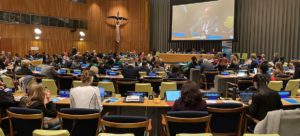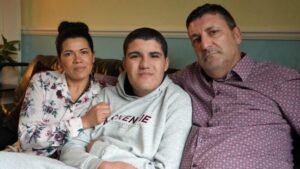On Sunday’s episode of The Excerpt podcast: U.S. Surgeon General Vivek Murthy used to talk about loneliness as a public health crisis. Now he says it’s an epidemic that urgently needs our attention. The World Health Organization agrees with him. Now as co-chair of its newly appointed Commission on Social Connections, Dr. Murthy has an even bigger platform from which to advocate for change, encouraging us to reach out and ask for help while also offering it to others who may need it. He joins The Excerpt to talk about why this problem is so persistent and what we can do to fix it.
Hit play on the player below to hear the podcast and follow along with the transcript below. This transcript was automatically generated, and then edited for clarity in its current form. There may be some differences between the audio and the text.
Podcasts: True crime, in-depth interviews and more USA TODAY podcasts right here https://www.usatoday.com/podcasts/
Dana Taylor:
Hello and welcome to The Excerpt. I’m Dana Taylor. Today is Sunday, December 24th 2023. He’s been shouting about it from the rooftops for years now. He’s presented his case to thousands across the country, both the young and old. He’s even written a book. Loneliness is not just a public health crisis, it’s an epidemic that urgently needs our attention.
The World Health Organization has recently decided it agrees with him. Now as co-chair of its newly appointed commission on Social Connections, U.S. Surgeon General Vivek Murthy has an even bigger platform from which to advocate for change, encouraging us to reach out and ask for help while also offering it to others who may need it. For many, addressing may just be a matter of life and death. Dr. Murthy, thank you for joining the Excerpt.
U.S. Surgeon General Vivek Murthy:
Thank you so much. I’m so glad to be with you today.
Dana Taylor:
Dr. Murthy, you’ve talked about how loneliness has a major impact on our physical and mental health, potentially leading to premature death and increasing one’s risk of dementia among other things. And recently you’ve said that being lonely is as deadly as smoking 12 cigarettes a day. Give a sense of the scope of the problem here. How bad is it?
U.S. Surgeon General Vivek Murthy:
Well, I’m so glad you asked because most of us probably think of loneliness as just a bad feeling, and it certainly is that. I’ve experienced loneliness as a child. I certainly had times I’ve struggled with loneliness as an adult as well, and it certainly doesn’t feel good. But most of us think that loneliness is just a bad feeling you should shrug off or suck up and deal with yourself.
What we may not have realized is that it has real consequences for our health, especially when it’s prolonged. And what we laid out in the advisory on loneliness and isolation that I issued in May was that being disconnected from other people, feeling lonely or isolated is associated with an increased risk of depression, anxiety, and suicide.
But it’s also associated with an increased risk of physical health outcomes, including a 29% increase in the risk of heart disease, a 50% increase in the risk of dementia among older people. One of the surprising statistics that we lay out is that the mortality associated with social disconnection is on par with smoking daily.
It’s even greater than the mortality risks that we see with obesity. And we think of smoking and obesity as important public health concerns. So the bottom line is loneliness and isolation are just as important in terms of public health concerns, and it’s why building social connection in our life has to be a vital priority.
Dana Taylor:
When we think of loneliness here in the US, many of us think older Americans, people whose families live far away, who live sequestered in their houses or apartments or even a long-term care facility. But you’ve said that age isn’t really the determining factor here. Why is that?
U.S. Surgeon General Vivek Murthy:
Well, it turns out people across the age spectrum experience loneliness and isolation. And right now about one in two adults in America are living with measurable levels of loneliness, one in two adults. That’s more adults than who have diabetes in our country. But the numbers are actually significantly higher among young people.
And this is a bit counterintuitive because we might think, “Well, young people are connected by devices, by technology, by social media. Why are they lonely?” Well, it turns out that to really feel connected to other people, what matters are the quality of our connections, not the quantity of connections. And while social media may allow us to be in touch with or seem connected with many, many people, the real question at the end of the day is, do we feel we have people who we can go to in a crisis?
Do we feel we can truly be ourselves with others? Do we feel like we’re known and seen and understood for who we are? If we do, then chances are we won’t feel lonely. But you can be surrounded by lots of people. You can have lots of followers or connections on social media, but not necessarily feel like you’ve got somebody who knows you or show up for you in a crisis. And that’s why having and cultivating high quality relationships is really vital for social connection.
And it’s something that many of us really need in our life now when we become increasingly disconnected from one another. And that’s having real consequences not only for our individual health, but frankly for the health of society as how lonely we are often can impact how we show up in the workplace, how our kids do in school, and how engaged we are in our communities.
Dana Taylor:
Well, as you’ve said, loneliness can also be existential. Someone at a holiday party surrounded by friends and family can still be lonely. Can you define that for us?
U.S. Surgeon General Vivek Murthy:
Yeah. So loneliness is a subjective feeling. It’s when the connections I feel I need in my life are greater than the connections I actually have. And in that gap, I experience loneliness. Now, some people may only need one or two people in their life who really know them well, who they can show up for in a crisis and who will do the same for them and they may feel perfectly fine. But other people may need a few more people. But the bottom line is, this is a subjective feeling and you can be surrounded by lots of people, but if you don’t feel that deep sense of connection to one or two of them, then you will likely feel quite alone.
Dana Taylor:
Okay, so I’d like to pivot to solutions. What’s the first step for an individual to take in tackling loneliness?
U.S. Surgeon General Vivek Murthy:
The good news about loneliness is there is a lot we can do to address it, to build connection in our own life. One of the first steps is just recognizing that if we are lonely, that we are not the only ones. There are a lot of people struggling with loneliness, and it doesn’t mean that you’re broken or something is fundamentally wrong with you. The second thing to realize is that small steps can make a big difference in how connected we feel.
Simply taking 15 minutes a day to reach out to someone we care about to let them know we’re thinking about them can make a big difference in how you feel. The second thing that can really help is making sure that when you are with people, when you’re catching up with a friend or having dinner with a family member, that you make that time count by giving them the benefit of your full attention.
And that can mean putting devices away when we’re engaging with other people. We’ve all had the experience of being in conversation where we knew that somebody else was distracted by their devices, and it really does affect the quality of connection we have. But the third thing I would suggest to people is that we also look for ways to serve others. Now, this is a little counterintuitive.
We might think, “Why should we serve others if we’re the ones struggling with loneliness? Aren’t we the ones who need help?” Turns out though, when we reach out to help other people, by simply checking on them if they’re having a tough day or helping a neighbor to clear their lawn if they’re having a hard time raking their leaves, these small acts of service, they actually help us forge a stronger connection to other people. And they also remind us that we have value to bring to the world.
That’s really important because the lonelier we get, the more we convince ourselves that we’re lonely because we’re not likable or because something is wrong with us. They can erode our self-esteem. So the bottom line is these small steps, they can help tremendously in how connected we are. And finally, just remember, this is about quality of connection, not about quantity.
You don’t need to have 50 or a hundred people who you consider your best friends. You don’t need to be going to big parties and large gatherings all the time to not feel lonely. You just need to have a couple of people in your life who you can be open with, who can show up for you in the time of crisis, and who you invest in, who you check on, who you show up for.
Dana Taylor:
Well, you’ve cited gratitude as one strategy in combating loneliness. Tell us why you think this approach is so important.
U.S. Surgeon General Vivek Murthy:
Well, gratitude is one of the most powerful exercises that we can engage in in our life. It’s a powerful feeling. When we’re feeling grateful, whether it’s for something that happened to us yesterday or 10 years ago, we actually can’t feel angry at the same time, we can’t feel resentful at the same time. The feeling of gratitude is powerful. And one of the things that I do often in colleges when I travel around the country is to engage students in an exercise and in a challenge in fact, that we call our five for five challenge.
The five for five challenge involves asking people to take one active connection each day for the next five days. That could either be by expressing gratitude to someone, by extending support to someone or by asking for help yourself. And just to give you a sense of how simple it is, if you just take 30 seconds and think about someone you’re grateful for, it could be somebody who showed up for you a few weeks ago when you were having a tough time.
Could be somebody who showed up for you years ago and you lost faith in yourself and you weren’t sure if you could make it. It could be somebody who noticed after a meeting or in class that you were feeling down and they just stopped to check on you, to ask how you were doing. If you just think of somebody that you’re grateful for and then pick up your phone and make a call or write a text or compose an email to them, just a couple of lines to say, “Hey, I was thinking about you.
I want you to know that I remember what you did for me and I’m so grateful for you.” That can be a very powerful experience that can not only extend your connection to them, but can also remind you that you’re worthy of connection and love and support. And that’s important for all of us to remember. And so these moments of gratitude are powerful because they remind us that we do have connections that we can draw upon in our life.
As one of my dear friends told me a long time ago, sometimes our problem is not that we don’t have friends, sometimes the problem is that we’re not experiencing friendships. We have people in our life who may be there for us if we choose to reach out. Maybe we even talk to them in a few years, maybe we haven’t seen them in a while, but chances are they may be also struggling with a sense of loneliness. And a simple call from us or message from us reaching out and checking in, might make all the difference in both of our lives.
Dana Taylor:
Well, as you mentioned earlier, one of the characteristics of social connectedness is having more than one person to turn to for support. And that can mean emotional support as well as physical support, someone getting you to the doctor on time when you need that. What gets us on the path to social connectedness and keeps us on it throughout our lives?
U.S. Surgeon General Vivek Murthy:
Well, I do think that we have to be intentional about building social connection in our life. It may have been 30, 40 years ago, that social connection just happened when people tended to stay more often in the cities that they grew up in and tended to change jobs less often, when they weren’t distracted from each other by technology, intended to be with one another face-to-face and run into each other in the grocery store at the bus stop.
But times have changed quite a bit. We don’t necessarily see each other in the grocery store if we’re having our groceries delivered to us. If everything else is coming to our doorstep, we may not be going to the retail store. We may move around more, change jobs more often, be distracted by technology. So we’ve got to be intentional about building connection in our day-to-day life. And to me, it starts with the small practices that we build into our routine.
When I wake up in the morning, one of the things I like to do is a brief meditation where I focus on gratitude, on thinking about the people in my life that I’m grateful for. It’s an exercise I also do at the very end of the day with my kids and with my wife before we all go to bed. The other thing I like to do is to make sure every day however busy it might be that I’m reaching out to somebody that I care about.
Even if it’s just for a few minutes. Maybe it’s calling my mother to say hello and checking in. Maybe it’s calling a friend who I knew was having a hard time just to check in and see how he’s doing. So I try to do that as well. And finally, I try to keep some sacred space in my life that is free from technology. And for me, that tends to be the dinner table. At night when I’m getting together with my wife and my two kids for dinner, we put our devices away so we can focus entirely on each other.
Our attention is really powerful. It has the ability to stretch time. When we’re fully present with somebody, not distracted by technology, that can make five minutes feel like half an hour. And the flip is true too. We might spend an hour with someone, but if we’re distracted by our devices constantly, sometimes it can seem like we barely have the chance to catch up or really understand one another. So these are small things that we can do, but we have to be intentional about it.
And finally, I would just recommend that if you’re thinking about making some of these changes in your life, that you actually do it with someone else. That could be your spouse, it could be a friend, could be a family member, but making a pact that you are going to lead a more connected life, that you’re going to build some of these practices into your daily routine, that can help keep you accountable and stay on track and together you can build the kind of connection that we all really need in our lives to be healthy, happy, and fulfilled.
Dana Taylor:
Dr. Murthy is the U.S. Surgeon General and newly appointed co-chair of the WHO’s Commission on Social Connections. Thank you so much for joining us, Dr. Murthy.
U.S. Surgeon General Vivek Murthy:
Thank you so much. It was wonderful to be with you.
Dana Taylor:
Thanks to our senior producer, Shannon Rae Green for production assistance. Our executive producer is Laura Beatty. Let us know what you think of this episode by sending a note to podcasts@usatoday.com. Thanks for listening. I’m Dana Taylor. Taylor Wilson will be back tomorrow morning with another episode of The Excerpt.




